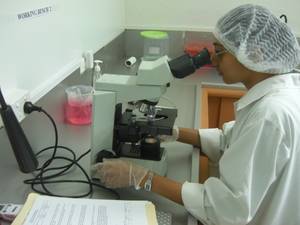Related News

A week long training workshop was carried out at the University of the South Pacific’s Institute of Applied Science in association with Orebro University of Sweden on Persistent Organic Pollutants or POPs. The training which was co-ordinated by Professor Gunilla Lindstrom and Professor Bert van Bavel of the MTM Research Centre, Orebro University focused on the further development of gas chromatography (GC) analytical techniques on the determination of POPs in a range of matrices. The training was a part of the United Nations Environmental Programme (UNEP) (Chemicals) scheduled professional development training schemes for IAS laboratory personnel involved in POPs analyses.
POPs are chemical substances that persist in the environment, bio-accumulate through the food web, and pose a risk of causing adverse effects to human health and the environment. With the evidence of long-range transport of these substances to regions where they have never been used or produced and the consequent threats they pose to the environment of the whole globe, the international community has now, at several occasions called for urgent global actions to reduce and eliminate releases of these chemicals.
The IAS laboratory is currently being developed, under UNEP assistance, as one of the six regional developing country laboratories in the world for the analysis of POPs. At present, sediment and air sample analyses are in progress and may develop further to involve other biota matrices such as mussels and fish samples.
Professors Lindstrom and Bert van Bavel, global leaders in the in the analyses of POPs, offer a huge wealth of experiences for their Fiji counterparts in the development of advanced GC techniques, methodology techniques- validation as required under UNEP (Chemicals) analytical conditions for POPs analysis. New columns, internal standards, and reference materials are also being supplied.